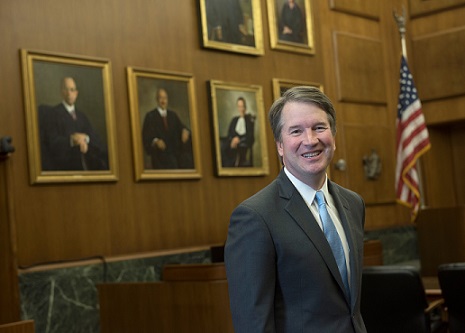
During the battle over now-Supreme Court Justice Brett Kavanugh’s confirmation, which centered around the former judge’s alleged sexual misconduct at his exclusive preparatory high school and at Yale University in the early 1980s, San Diego State officials used the moment to direct attention to the drinking and sexual assault in the modern-day college environment.
SDSU President Adela de la Torre addressed the issue in a campus-wide email on Oct. 1.
“We want to take this moment to emphasize our commitment to providing support systems to address sexual misconduct, including sexual violence and/or sexual harassment, dating violence, domestic violence and stalking issues,” de la Torre said in the email. “We can work together to all become upstanders in our respective communities so that we can sustain an educational and working environment free from sexual violence and harassment.”
Criticism of Kavanaugh — who’s expected to be a reliable conservative vote on the Supreme Court — began when President Donald Trump first nominated him to replace retiring Justice Anthony Kennedy, who’s commonly seen as the court’s moderate swing vote.
Word of a letter detailing a sexual assault accusation, which the public would later find out was written by Stanford University Professor Christine Blasey Ford, sparked the controversy surrounding Kavanaugh’s confirmation that would become central during the Sept. 27 senate hearings where in which both Ford and Kavanaugh testified.
On Saturday, Oct. 6, following an FBI investigation into the accusations, Kavanaugh was confirmed as a Supreme Court justice with a senate vote of 50-48.
De la Torre’s campus-wide email, which directed students to sexual assault resources on campus, reminded students of the ways the issue of sexual assault manifests on college campuses.
Although SDSU provides many resources for sexual assault survivors, some students have expressed their concern over how reliable the sources are.
Cellular biology senior Peyton Cook said she was critical of the resources offered on campus due to the experiences of some of her friends.
“I don’t really like the resources on campus,” Cook said. “I have had friends that have tried to make appointments when they have been in bad places just wanting to talk to a counselor and they’re told to wait four months.”
Title IX coordinator Jessica Rentto said she these criticisms of campus Counseling and Psychological Services are based in misperceptions.
“When students call to make an appointment, they are asked a number of questions and one of those questions relates to whether or not the person has recently experienced sexual violence,” Rentto said. “If they have, they get prioritized to meet with someone as soon as possible.”
Rentto said therapy resources on campus for sexual assault survivors include Counseling and Psychological Services, which is a confidential resource. On top of this, Calpulli has it’s own victim advocate who is employed by the Center for Community Solutions, San Diego County’s crisis center.
“(The advocate) is a great resource working with victim survivors including faculty and staff to ensure that they are connected with a host of resources,” Rentto said. “Anything from legal resources to advocacy to counseling.”
She said the university also employs a number of Title IX deputy coordinators who work closely with students, faculty and staff to connect them with resources regarding sexual assault.
“The Title IX coordinators are a great resource to go over rights, options and resources,” Rentto said.
Rentto said Title IX deputy coordinators can help to inform survivors of how to file an administrative complaint or police report. If the survivor does not seek to pursue either of these options, the deputy coordinators will work to point them to other campus resources to help them be successful.
“Across campus, there are a number of people trained in this area and we continue to train faculty, staff and students on this topic so that people can be allies for anyone reporting or disclosing that they have experienced sexual violence,” Rentto said.
Interdisciplinary studies senior Melat Zippi said students should look beyond the university and instead look at the larger culture that perpetuates these kinds of issues.
“The school does enough to provide a place where women can go to when they are assaulted, but the culture does not on college campuses,” Zippi said. “I know a couple girls that believe they were sexually assaulted but are not getting the support they needed because of the culture on campus.”
Public administration junior Delanie McGinn said students should take this opportunity to better address the stigmas surrounding issues of sexual assault.
“It is really frustrating what is happening but I feel empowered now because this just means that we have to fight harder and we have to keep going,” McGinn said. “My understanding is that there are a lot of resources for folks on campus but there still is a stigma surrounding sexual assault and violence that it is hard for survivors to come forward if they want to.”
For students who seek additional support in regards to sexual violence experiences, the Women’s Resource Center hosts a confidential support group, Rise, every Thursday from 12:30 to 1:45 p.m.






